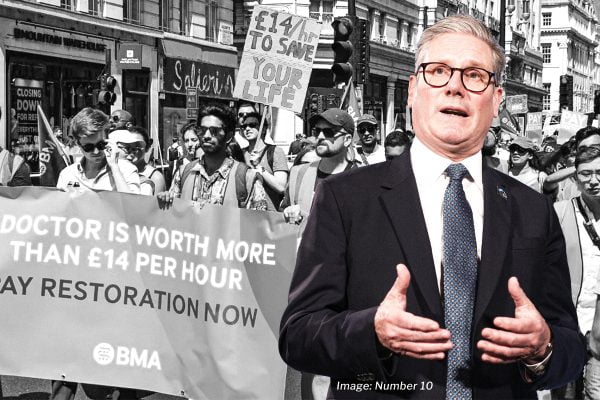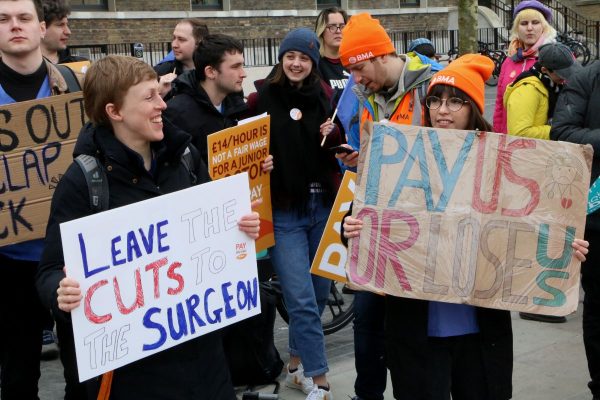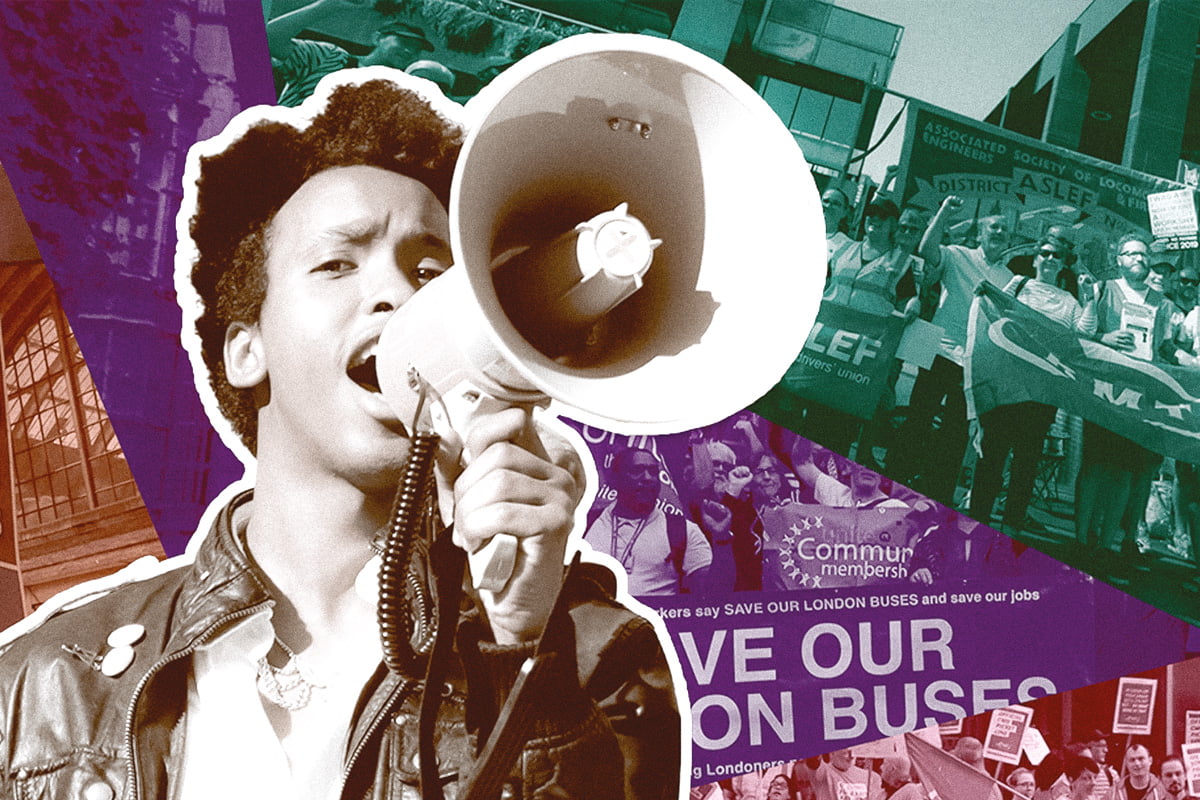From 8-11 September, the TUC will be gathering to discuss its policies over the next year. This will be the first time in many years that this will happen under a Labour government, rather than the Tories. The pressures on the union leaders will therefore be immense.
On the one hand, Labour – and big business standing behind them – will be putting pressure on the union leaders to ‘hold the line’, and to try and manage workers’ expectations as Starmer and co. move into a new phase of austerity.
On the other, the rank and file of the trade union movement have put up with decades of attacks and degradation. They will not be keen to put up with more, especially at the hands of a ‘Labour’ administration.
Impending attacks
Labour are clearly keen to draw a line under the industrial unrest that the Tories faced (and often actively provoked). That explains the measures they’ve taken so far – offering public sector workers an above-inflation pay deal, and promising a ‘New Deal’ on workers’ rights.
But the cause of the unrest has not gone away. Workers are still much worse off than they were in 2008. And the government’s ‘generous’ pay deals don’t even cover large chunks of the workforce.

Moreover, there are wider issues at work than pay. Schools and hospitals face crumbling infrastructure. And overwork is causing severe staffing crises across the public sector.
Local councils are still staring down the barrel of bankruptcy, with all that this entails for services in some of the most hard-hit working-class areas. Rail and medical workers alike know that their bosses are looking to work them ever harder, safety be damned.
Labour have made no secret of their plans for future austerity – as seen by their decision to cut energy subsidies from millions of pensioners. And the bosses have made clear that they intend to resist any moves to strengthen workers’ legal rights.
Begging the Labour leaders to be nice won’t stop the impending attacks. Starmer has his orders from big business, and he intends to carry them out.
‘Our’ government?
One big issue is the anti-union laws. The FBU is moving a motion at congress on this topic.
Labour have announced that they will repeal both the Minimum Service Levels Act and earlier anti-union laws.
These laws were passed by the Tories to try and bridle the trade union movement. Their repeal is to be welcomed. Anything that strengthens the hand of organised labour is a good thing, especially after decades of attacks.
Some trade union leaders are keen to spread illusions about what this means, however, coming on top of the Labour government’s “generous” pay offers.
“I don’t think it’s given the green light to more industrial action,” TUC general secretary Paul Nowak said on this subject to the Financial Times, for example. Instead the TUC leader stated that he saw these measures as “the green light to getting round the table and finding a positive way forward”.
Compare and contrast.
Two years of political meddling & incompetence = rail strikes.
Six weeks of a serious government that cares about public transport & is prepared to negotiate = an offer being recommended to members.
Well done @ASLEFunion & @LouHaigh https://t.co/ICZrnCAvoC
— Paul Nowak (@nowak_paul) August 14, 2024
In other words, instead of the trade union leaders using improved union rights as a weapon to fight for workers’ demands, they are being used as a bargaining chip with the employers; as a form of horse-trading with Starmer’s big business government.
Starmer and Reeves will no doubt be delighted. These quotes show that the TUC is swallowing their bait.
Gestures by Labour over workers’ rights are little more than a sop to the trade union leaders. In return, they will want these same leaders to hold back the working class when the time comes for harsh cuts.
As Chancellor Rachel Reeves put it, in future there will be “no blank cheques for unions over pay”. A host of other attacks on working terms and conditions – euphemistically called ‘productivity deals’ – are already being planned.
This is why Labour needs the union leaders on board, inside the tent pissing out, so to speak. And it is why these leaders’ timid appeals to ‘our’ government are ultimately hollow.
Class struggle
But there is another pressure on the TUC. Workers can see that the pay deals aren’t going to bring them pay parity. They can see the infrastructure crumbling around them, the rise of far-right gangs, and the plans of the government – which are to do precisely nothing about any of this.
Workers will not be impressed by yet more hot air from leaders who prefer backroom negotiations to determined struggle. They have seen what happens when this path of class compromise and collaboration is taken. Just look at Port Talbot, where jobs are being slashed virtually without any fight.

And while Labour hopes that offering pay deals and scrapping anti-union laws will sate the union leaders, that is not the effect it is likely to have on the rank and file. Instead, for ordinary workers, appetite will come with eating.
Many of these workers will see the repeal of the anti-union laws as a chance to claw back some of what they’ve lost – not as a reason to be confident in Labour. And when Starmer and Reeves unleash attacks, it will be like a red rag to a bull.
History shows us that the pressure from below can force trade union leaders to go much further than they would like to.
But ultimately, for victory to be secured, our class needs more than platitudes and resolutions, passed once at a congress and then ignored. It needs a militant battle plan, a socialist programme to link our struggles together, and a fighting leadership to carry this out.
Port Talbot: The latest insult
Maciej Krzymieniecki, Swansea RCP
By the end of this month, Tata will stop its operations at the last remaining blast furnace in Port Talbot, marking an end of the steelworks’ ability to produce liquid iron from ore.
The whole episode is a scandalous betrayal of the working class. The unions did everything they could to hold the workers back.
Forced by the pressure from below, the unions called strike ballots. All three of these returned votes in support of action, in spite of Tory anti-strike laws.
Despite this mandate, Community and GMB refused to call strikes, ignoring their members’ democratic wishes. Meanwhile, Unite announced a strike date…only to then cancel it at the eleventh hour in the face of the bosses’ threats!

Workers’ militancy cannot be used as a mere bargaining chip. It is not a tap, to be turned on and off.
The union leaders banked that a Labour government would come to save them, and delayed things as long as possible. To nobody’s surprise, however, Starmer has not come to the rescue.
This Labour government is in favour of the bosses, not the workers. Their promise of “millions” of planned steel investment has failed to save a single job. All it has done is smooth the closure process for Tata.
As a result, many workers have already accepted voluntary redundancies. Before our eyes, Port Talbot is about to become yet another ghost town.
Although this betrayal is crushing for workers, it comes with an important lesson: the working class can only trust itself.
If our leaders are not fit for purpose, they need to be replaced by those who are not scared to take on the bosses.
Starmer’s back-to-school run: More misery for teachers!
Mark Anthony, NEU member (personal capacity)
For most teachers, September sees a return to work. In an effort to draw a line under the strike action of last year, Starmers’ Labour has announced a 5.5 percent pay offer for teachers.
The NEU’s leaders have agreed to recommend the deal. But the NEU rank and file know that the real issue isn’t pay, but appalling working conditions.
Children are starving. Schools are collapsing, literally and figuratively. On my first day, I had to plan my lessons while contractors finished putting our school back together!
We have also been told that Ofsted is going to be reformed. But the extent of this is simply changing one-word report summaries to multiple-word ones!
Notably, teaching assistant staff have already voted to reject their pay offer, and are now being balloted for strike action. Something similar could happen with teachers, who have as much to be angry about.
The only solution is to fully abolish Ofsted; seize the wealth of the super-rich to fund schools; and put education workers and working-class communities in control of the curriculum. Then we could have an education system that works for students and staff.
BMA pay deal: A rock and a hard place
An NHS resident doctor
The government and BMA leadership have come to a tentative agreement in our dispute. We have been holding strikes for the last two years. After months of negotiation, the deal has now been put to the membership.
The feeling on the ground towards the deal is mixed, and rightly so. Messages from the BMA leadership have been positive, but the numbers speak for themselves. In our fight for full pay restoration, we are a step – and a small step at that – closer to our goal.

Colleagues are unsure or sceptical of what’s on offer. There are conflicting narratives based on how the numbers are presented: a whopping 22 percent pay rise versus a real-term pay increase of 4 percent. Some feel stuck between a rock and a hard place – the choice between further strikes (and loss of pay) or a meagre pay deal.
What’s distinctly lacking is any groundswell support for the deal.
The campaign to reject the deal has started, with members from the Broad Left faction taking the lead. But with the absence of rank-and-file bodies like trade union branches, and lethargy starting to set in, it will prove to be a tough battle.
Added to this is a split within the faction currently leading the BMA, Doctors’ Vote.
What is needed to win this fight is escalation – not just in the number of strikes, but who we strike with.
The crisis in the NHS crushes all staff, from cleaners to physiotherapists. United strike action, extending to workers across the public sector, is the only way to oppose Starmer and Reeves’ austerity agenda.
Until then, it is understandable that BMA members remain uncertain about the deal before them.






